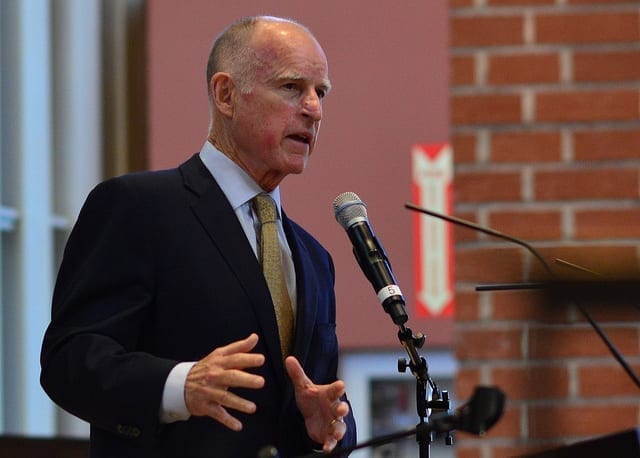California Gov. Jerry Brown signed a slew of bills on Sunday that were inspired by the burgeoning #MeToo movement.
Each proposal was, according to the Los Angeles Times, intended to combat gender inequality and violence. Among the bills was a measure prohibiting confidential settlement agreements that would prevent the publication of facts related ‘sexual assault, sexual harassment or workplace discrimination.’
Sponsored by California state Sen. Connie M. Leyva, SB-820 was apparently inspired by reports that Hollywood producer Harvey Weinstein made extensive use of nondisclosure agreements to clear harassment complaints.
The settlements, notes the LA Times, all stipulated that recipients maintain confidentiality.
Interestingly, Leyva’s bill also allows complainants to ‘request provisions in settlement agreements to shield his or her identity.’
The proposal wasn’t popular among business groups and advocates, which say confidentiality is sometimes necessary. In a letter asking Brown to exercise his veto, a pro-business coalition wrote, “by potentially eliminating confidentiality, SB-820 exposes employers to a public presumption of guilt even though the decision to settle was not based upon merit at all. To avoid this public image of guilt, SB-820 will drive employers to fight these cases in court instead of resulting in any early resolution.”
?@JerryBrownGov Signs Bills to Protect and Support Women, Children and Working Families: https://t.co/A6TcDlEoVb Stay tuned for more bill action.
— Gov. Brown Press Office (@GovPressOffice) September 30, 2018
Brown had, in fact, vetoed a similar bill in 2015 and referenced that decision on Sunday.
Known as AB 3080, that measure would have banned employers from requiring new hires to waive their right to pursue litigation. But that bill didn’t appear compatible with a Supreme Court ruling which favored businesses’ ability to mandate waivers.
“The direction from the Supreme Court since my earlier veto has been clear—states must allow the Federal Arbitration Act and the Supreme Court’s interpretation of the Act,” Brown wrote, calling AB 3080 and any similar legislation simply ‘impermissible.’
Along with SB-820, Brown also signed off on SB-1300 by state Sen. Hannah-Beth Jackson.
SB-1300 ‘will expand anti-harassment provisions’ in California law, ‘including the use of nondisparagement agreements that prevent employees from speaking publicly about incidents in the workplace.’
Nondisparagement agreements, similar to confidential settlements, have attracted criticism by effectively barring employees from speaking out about workplace injustices.
Jackson’s bill, writes the LA Times, provides some direction to judges. Under its guidance, SB-1300 will allow courts to consider a single incidence of harassment as sufficient to satisfy the ‘severe and pervasive’ pattern which constitutes workplace sexual harassment.
The California Chamber of Commerce only recently removed its ‘job-killer’ label from SB-1300 but remains opposed to its passage into law. The CCC said the law “will significantly increase litigation against California employers and limit their ability to invest in their workforce.”
Sources
Gov. Jerry Brown signs a slate of bills inspired by the #MeToo movement


Join the conversation!